#also why does the main character being queer feel off to me?
Text
The fandom echo chamber: fanon, microanalysis and conspiracy brain
As someone who has been in fandom spaces, on and off, for 20 years, I find some fascinating trends popping up in the last decade that I thought to be fandom-specific but clearly aren’t. So, I would like to do a little examination of where those things come from, how they are engaged with, and what it says about the way we consume media. This is a think piece, of sorts, with my brain being the main source. As such, we will spend some time down the memory lane of a fandom-focused millennial.
This is largely brought about by Good Omens. But it’s also not really about Good Omens at all.
Part one. Fanon.
The way we see characters in any story is always skewed by our very selves. This is a neutral statement, and it does not have a value judgement. It’s simply unavoidable. We recognise aspects of them, love aspects of them, and choose aspects of them to highlight based entirely on our own vision of the universe.
Recognition comes into this. There is a reason so many protagonists of romance novels have a “blank slate” problem. Even when they do not, we love characters who are like us or versions of us that we would like to be. And when we say “we”, I also mean, “me”.
(I remember very clearly this realisation hit me after a whole season of Doctor Who with writing which I hated utterly when I questioned why I still clung so incredibly hard to Clara Oswald as my favourite companion. Then I looked at myself in the mirror. Oh. Well. That would do it, wouldn’t it?)
Then, there is projection, and, again, this is a neutral statement. Projection exists, and it is completely normal and, dare I say it, valid way of engaging with — well, anything. Is the character queer? Trans? Neurodivergent? Are they in love? Do they like chocolate? Are they a cat person? Well, yes, if this is what the text says, but if the text does not say anything… You tell me. Please, do tell me. Because, in that moment of projection, they are yours.
And then, there is fandom osmosis, and that is the most fascinating one of them all, the one that is not very easy to note while you are inside the echo chamber. It’s the way we collectively, consciously or not, make decisions on who or what the characters are, what their relationships are, and what happens to them.
(Back when I was writing egregiously long Guardian recaps on this blog I actually asked if Shen Wei’s power being learning actually was stated anywhere in the canon of the show. Because I had no idea. I have read and reread dozen of fanfics where that is the case, and at some point through enough repetition, it became reality.)
We are all kind of making our own reality here, aren’t we?
Back when things were happening in a much less centralised manner - in closed livejournal groups, and forums of all shapes and sizes - I don’t remember there being quite as much universally agreed upon fanon. Frankly, I don’t remember much of universally agreed upon anything. But now, everything is in one place: we have this, and we have AO3, and it’s wonderful, it really is so much easier to navigate, but it’s also one gigantic reality-shifting echo chamber, with blogs, reblogs, trends, and rituals.
Accessibility plays its part, too. If you were, say, in Life on Mars (UK) fandom between seasons, and you wanted to post your speculation fic, you had to have had an account, and then find and gain access to one of the bigger groups (lifein1973 was my poison, but ymmv), and then, if you feel brave you may post it, but also, you may want to do so from your alt account if you wanted to keep yours separate, and then you would have to go through the whole process again. And I’m not saying that fan creations then were somehow inherently better for it than fan creations now (although Life on Mars Hiatus Era is perhaps a bad example - because some of the Speculation Fic there was breathtaking), but there is something to say about the ease of access that made the fandoms go through a big bang of sorts.
(I mean, come on, I can just come here and post this - and I am certain people will read it, and this blog is a pandemic cope baby about Chinese television for goodness sake.)
The canon transformations that happen in the fandom echo chamber truly are fascinating to witness as someone who is more or less a fandom butterfly. I get into something, float around for a bit, then get into something else and move on. I might come back eventually when the need arises, but I don’t sustain a hiatus mind-state. This means that when I float away and return, I find some very intriguing stuff.
Let’s actually look at Good Omens here. Season two aired, and I found it spectacular in its cosy and anguished way; deliberately and intelligently fanfic-y in its plot building; simple but subversive, and so very tender. (I will have to circle back to this eventually, because, truly, I love how deliberately it takes the tropes and shatters them - it’s glorious). And, to me - a person who read the book, watched the first season, hung around AO3 for a few weeks and moved on - absolutely on-point in terms of characterisation.
So imagine my surprise when the fandom disagreed so vehemently that there are actual multi-tiered theories on how characters were not in possession of their senses. Nothing there, in my mind, ever contradicted any of the stated text, as it stood. This remained a strange little mystery until I did what I always do when I flutter close to an ongoing fandom.
I loaded AO3 and sorted the existing fic by popularity. And there it was, all there: the actual earth-shattering mutual devotion of the angel and the demon; willingness to Fall; openness and long heart-aching confession speeches. There was all of the fanon surrounding Aziraphale and Crowley, which, to me, read as out of character, and to one for whom they became the reality over the last four years, read as truth.
Again, only neutral statements here. This is not a bad thing, and neither this is a good thing, this is just something that happens, after a while, especially when there are years for the fandom-born ideas to bounce around and stew. I can’t help but think that so much of what we see as real in spaces such as this one is a chimaera of the actual source and all the collective fan additions which had time and space to grow, change, develop, and inspire, reverberating over and over again, until the echoes fill the entirety of the space.
Eventually, this chimaera becomes a reality.
Part two. Microanalysis
Here are my two suppositions on the matter:
1. Some writers really love breadcrumb storytelling.
Russel T Davies, for instance, on his run of Doctor Who (and, if you are reading it much later - I do mean the original one), loved that technique for his seasonal arcs. What is a Bad Wolf? Who is Harold Saxon? Well, you can watch very very carefully, make a theory, and see it proven right or wrong by the end of the season.
Naturally, mystery box writers are all about breadcrumb storytelling: your Losts and your Westworlds are all about giving you snippets to get your brain firing, almost challenging you to figure things out just ahead of the reveal.
2. We, as humans, love breadcrumbs.
And why wouldn’t we? Breadcrumbs are delicious. They are, however, a seasoning, or a coating. They are not the meal.
Too much metaphor?
Let’s unpack it and start from the beginning.
Pattern recognition colours every aspect of our lives, and it colours the way we view art to a great extent. I think we truly underestimate how much it’s influenced by our lived experiences.
If you are, broadly speaking, living somewhere in Western/North-Western Europe in the 14th century, and you see a painting in which there is a very very large figure surrounded by some smaller figures and holding really tiny figures, you may know absolutely nothing about who those figures are, but you know that the big figure is the Important One, and the small ones are Less Important Ones, and the tiny ones are In Their Care. You know where your reverence would lie, looking at this picture. And, I imagine, as someone living in the 14th century, you may be inspired to a sense of awe looking at this composition, because in the world you live in, this is how art works.
If you, on the other hand, watch a piece of recorded media and see the eyes of two characters meet as the violins swell, you know what you are being told at that moment. You don’t have to have a film degree to feel a sort of way when you see a green-tinged pallet used, when cross-cuts use juxtaposing images, or notice where your focus is pulled in any given shot. This stuff - this recognition of patterns - has been trained into us by the simple fact that we live in this time, on this planet, and we have been doing so long enough to have engaged recorded media for a period of time.
As humans, we notice things. Our brains flare up when they see something they recognise, and then we seek to find other similar details and form a bigger picture. This often happens unconsciously, but sometimes it does not. Sometimes we do it on purpose: finding breadcrumbs in stories is a little bit like solving a mystery. It allows us to stretch that brain muscle that puts two and two together. It makes us feel clever.
So yes, we love breadcrumbs, and, frankly, quite a lot of storytelling takes advantage of this. It’s very useful for foreshadowing, creating thematic coherence, or introducing narrative parallels and complexity. It’s useful for nudging the viewer into one or the other emotional direction, or to cue them into what will happen in the next moment, or what exactly is the one important detail they should pay attention to.
Because this is something media does intentionally, and something we pick up both consciously and not, it is very hard to know when to stop. We don't really ever know when all of the breadcrumbs have been collected. It becomes very easy to get carried away. There is a very specific kind of pleasure in digging into content frame by frame, soundbite by soundbite, chasing that pleasure of finding.
But it is almost never breadcrumbs all the way down. They are techniques to help us focus on the main event: the story. I truly believe those who make media want it to reach the widest possible audience, and that includes all of us who like to watch every single thing ever created with our Media Analysis Goggles on and those who are just here to enjoy the twists and turns of the story at the pace offered to them. And I think, sometimes in our chase to collect and understand every little clue we forget that media is not made to just cater for us.
One can call it missing a forest for the trees. But I would hate to mix my metaphors, so let’s call it missing a schnitzel for the breadcrumbs.
Part three. The Conspiracy Brain.
If you are there with me, in the midst of the excited frenzy, chasing after all those delicious breadcrumbs, then patterns can grow, merge together, and become all-encompassing theories. Let’s call them conspiracy theories, even though this is not what they truly are.
So, why do we believe in conspiracy theories?
One, Because We Have Been Lied To.
All conspiracies start with distrust.
If you are in fandom spaces - especially if you are in fandom spaces which revolve around a queer fictional couple - especially-especially if you have been in such spaces for a period of time, you have most certainly been lied to at one point or another.
We don’t even have to talk about Sherlock - and let’s not do that - but do you remember Merlin? Because I remember Merlin. Specifically, I remember the publicity surrounding the first season, with its weaponised usage of “bromance” and assertions that this whole thing is a love story of sorts, and then the daunting realisation that this was all a stunt, deliberately orchestrated to gather viewership.
And, because we were lied to in such a deliberate manner for such an extensive period of time, I genuinely believe that it forever altered our pattern recognition habits, because what was this if not encouragement to read into things? Now we are trained to read between the lines or see little cries for help where they might not be. Because we were told, over and over again, that we should.
(Yes, I think we are all existing in these spaces coloured by the trauma of queer-bating. I am, however, looking forward to a world where I can unlearn all of that.)
Two, Cognitive Dissonance.
The chain reaction works a bit like this: the world is wrong - it can’t possibly be wrong by coincidence - this must be on purpose - someone is responsible for it.
Being Lied To is a preamble, but cognitive dissonance is where it all originates. In so many cross-fandom theories I have noticed a four-step process:
A) this is not good
B) this author could not have made a mistake
C) this must be done on purpose
D) here is why
(Funny thing is, I have been on the receiving end of the small conspiracy spiral, and it is a very interesting experience. Not relevant to this conversation is the fact that a lot of my job revolves around storytelling. What is relevant is that my hobbies also revolve around storytelling. And one of them is DnD. Now, imagine my genuine shock when one of the players I am currently writing a campaign for noticed a small detail that did not make a logical sense within the complexity of the world, and latched on to it as something clearly indicating some kind of a secret subplot. Their thinking process also went a bit like this: this detail is not a good piece of writing — this DM knows how to tell stories well — this is obviously there on purpose. It was not there on purpose. I created a clumsy shorthand. I erred, in that pesky manner humans tend to. And, seeing this entire thought process recited to me directly in the moment, I felt somewhere between flattered and mortified.)
This whole line of thinking, I think, exists on a knife’s edge between veneration and brutal criticism, relentlessly dissecting everything “wrong”, with a reverent “but this is deliberate” attached to it like a vice, because it is preferable to a simple conclusion that the author let you down, in one way or another.
Three, Intentionality
I believe that there is no right or wrong way of engaging with stories, regardless of their medium, and assuming no one gets hurt in the process. While in a strictly academic way, there is a “correct” way of reading (and reading into) media, we here are largely not academics but consumers; consumption is subjective.
However, this all changes when intentionality is ascribed.
The one I find particularly fascinating is the intentionality of “making it bad on purpose” because, as open-minded as I intend to always be, this just does not happen.
It certainly does not happen in long-form media. Even in the bread-crumb mystery box-type long-form media.
When television programs underdeliver, they also underperform, and then they get cancelled.
If all the elements of Westworld Season 4 that did not sit together in a completely satisfactory way were written deliberately as some sort of deconstruction for the final season to explore, then it failed because that final season will now never come.
(There will likely never be a Secret Fourth Episode.)
And look, I am not here to refute your theories. Creativity is fun, and theorising is fantastic.
But, perhaps, when the line of thought ventures into the “bad on purpose” territory, it could be recognised for what it is: disappointment and optimism, attempting to coexist in a single space. And I relate to that, I do, and I am sorry that there is even a need for this line of thinking. It’s always so incredibly disappointing that a creator you believed to be devoid of flaws makes something that does not hit in the way you hoped it would. It’s pretty heartbreaking.
Unfortunately, people make mistakes. We are all fallible that way.
Four, Wildfire.
Then, when the crumbs are found, a theory is crafted, and intentionality is ascribed, all that needs to happen is for it to catch on. And hey, what better place for it than this massive hollow funnel that we exist in, where thoughts, ideas and interpretations reverberate so much they become inextricable from the source material in collective consciousness.
Conspiracy theories create alternate realities, very much like we all do here.
So where are we now?
I am not here to tell you what is right and what is wrong; what is true, and what is not. We are all entitled to engage with anything we wish, in whichever way we wish to do it. This is not it, at all.
All I am saying is… listen.
Do you hear that echo?
I do.
#fandom thoughts#fanon#good omens#good omens 2#bbc sherlock#merlin bbc#think piece#it's been years and I still have no idea how to tag#conspiracy theories#fandom content#all fandoms
2K notes
·
View notes
Text
Dekus no good, very bad, faceplant into masculinity and internalized homophobia
I made this a thought post from chapter 402 originally, but I can’t let these thoughts fester any longer. Gotta be correct about it 🫶🫶🫶
Alright so when I originally talked about this on a couple of platforms (not just tumblr, tiktok too and a bit on Twitter that has no connection to this account lmao) I feel like people told me that I was “stretching” with my assumptions.
But then Toga’s backstory being told to Ochako was… directly referenced to a queer allegory. And in 394, she directly says that she likes girls. It’s the thing said last, implying it’s something she’s still ashamed of feeling.
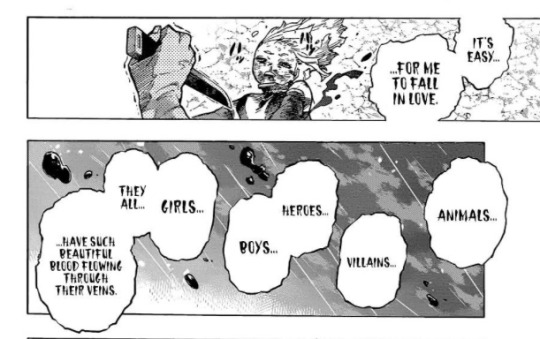
This chapter basically confirmed in my mind that Himiko’s blood quirk was the equivalent to the homophobia that was probably in her own household. And in my mind, that means that blood quirk = metaphor on her queer experience.
And then suddenly, the pieces clicked into place.
In 348, Izuku disagrees with Himiko and Ochako’s ideals—not only at the idea of girly romance, but also at unconventional romance.
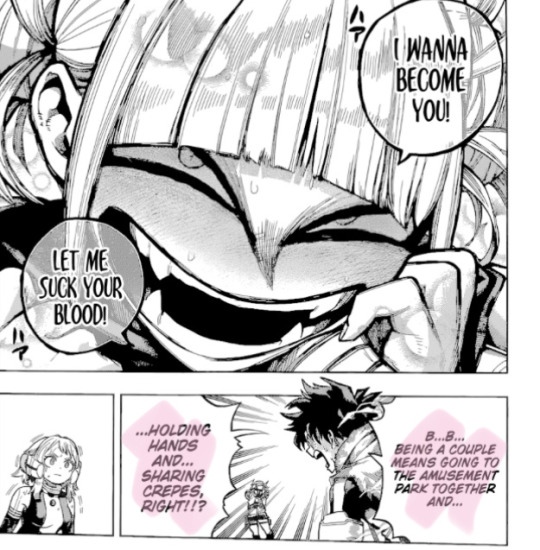
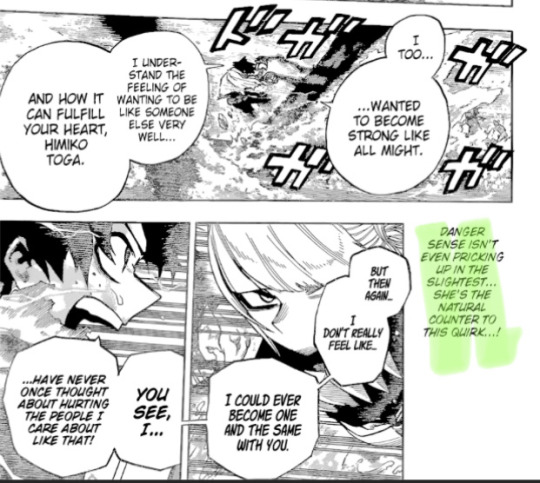
Ochako has distanced herself due to Izuku’s inability to confront his own feelings. Shown both physically and metaphorically.
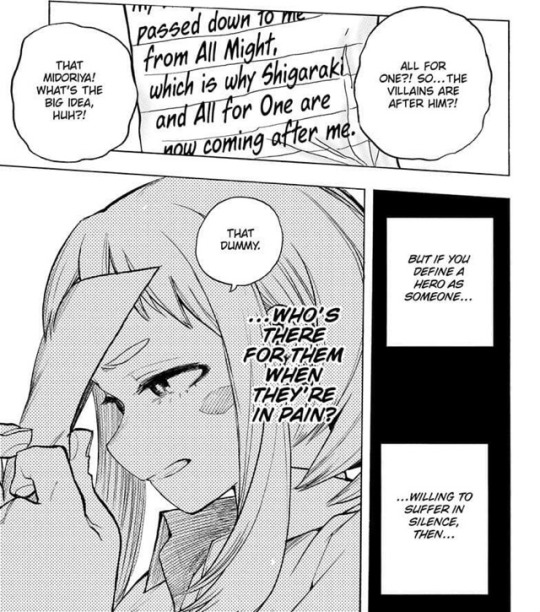
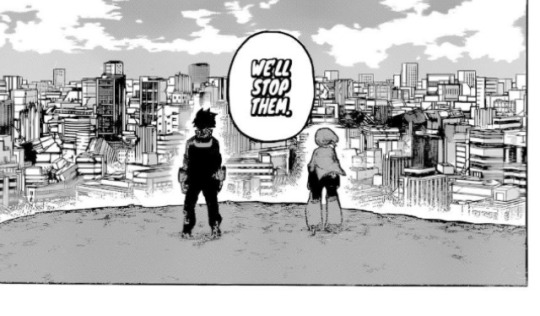
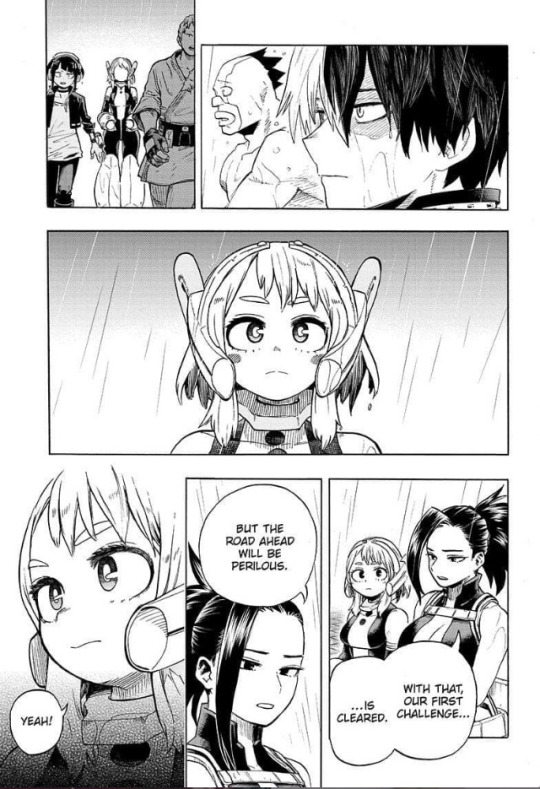
Ochako took all the steps to walk away because from Izuku. Because Izuku held her back.
Or more rather, she realized that Izuku was no allmight, but rather just an average boy in need of saving as anyone else. He is someone who’s flaws cannot align with Ochako’s own ideals for a relationship.
Because ochako is weird.
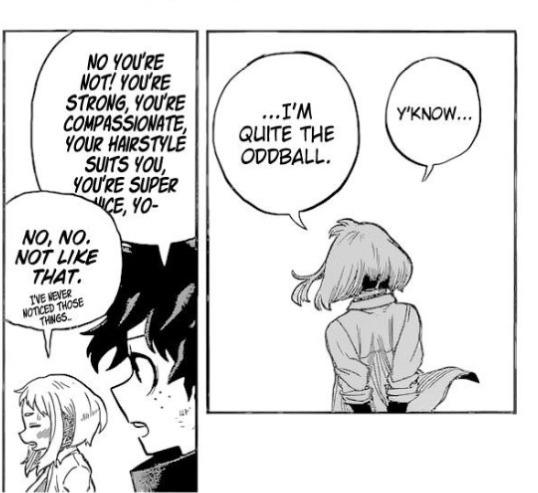
Izuku holds her back. She can’t be everything she needs to be while around him.
And that’s something Izuku’s not going to understand, not like how she needs him to understand.
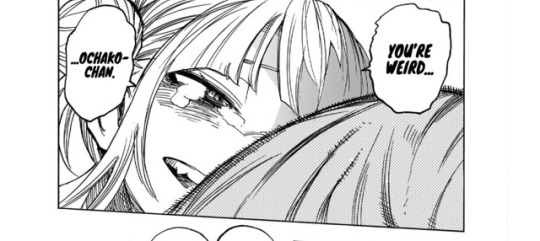
And Himiko knows who Ochako is on a more fundamental level than Izuku ever will, and that’s okay.
I feel like whenever I talk about these character flaws having to do with Izuku, it almost sounds like I’m bashing him? I swear, I’m not, it makes complete sense as to why he is this way. And there are people (Katsuki) in the world who can have this in a relationship under the right communication, and some people can’t. And that’s just how we exist. That’s okay. We don’t all have to be compatible with everyone.
Back to the main point, the pieces and the people putting those pieces together were starting to see their parallels.
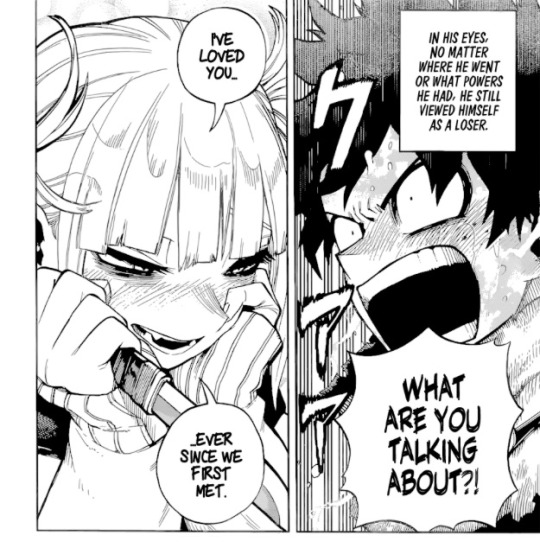
Even the manga placement parallels them, especially with how clever I feel horikoshi can be with his paneling.
Looking down, looking up. Both three quarter angles. Small mouth expression, big mouth expression. And that blush.
Fake smile when unhappy. Falling for someone who is dying, who you’d do anything for, even toe the line of death defending them, fixing them—just because you can’t help but love someone you wish had walked into your life sooner (or in Izuku’s case, accepted into your life sooner).
Someone you’d sacrifice for. Someone you’re violent for. Someone you’d kill for.
Someone you’d rather let an entire population of people die for than live without.
Someone you’re undeniably, unequivocally, selfish for.
And yet Izuku doesn’t recognize his same symptoms of love through Himiko Toga as Ochako does.
Himiko must be dehumanized to Izuku, because if she’s a person, then she is him.

(What’s even more interesting about this panel, is that if the characters were reversed and it was about Izuku’s violent feelings over protecting Katsuki, danger sense would be going off constantly. So toga is the perfect counter, but Izuku is the ultimate weakness.)
So, okay, how exactly do these things matter? How does this have to do with Izuku’s own personal struggle over his masculinity?
I think what’s important to clarify here is that when I say “internalized homophobia”, I don’t mean that he necessarily is beating himself up over the fact that he likes a boy instead of a girl.
I think it’s connected to his fear of rejection, and his own personal issues having to do with remaining a “strong man” instead of a “weak man”.
Izuku may not believe that liking men is anyone’s business but his own, but does Katsuki think that?
Izuku has called his feelings of admiration gross. Not that he himself is an awful person for feeling them, but that Katsuki will be the one to think they’re gross. And he’s worked so hard to get to this point in their relationship, he doesn’t wanna let it go over some stupid feelings.
And this is where toga comes into the picture, his parallels between her, because just how is Toga supposed to know that Ochako isn’t judging her for her feelings? Technically, all of the things she’s said before the final fight between them have only proved the inevitable. That Toga is gross, a freak, a predator, a danger, because she loves a woman.
How is Izuku supposed to interpret being called a stalker by Katsuki? How is he supposed to interpret when people call him creepy for his muttering and analyzation? How is he supposed to interpret being called a crybaby by his idol, Katsuki, and everyone else when he cannot control that?
How can he handle feelings that are out of his control, and still believe that they’re okay?
And at the very least, even if homophobia doesn’t exist in mha, heteronormativity does. Especially shown through Ashido, a straight girl.
None of that is necessarily Allmight, Katsuki, or even Ochako’s fault, because of course they’re just teasing him—but it doesn’t change the fact that it affects how he perceives himself.
So when I say that Izuku has problems with internalized homophobia, I mean that he is afraid of how the people around him will perceive him, than a constant feeling of self hatred due to not liking women.
And when I say that his internalized homophobia is an extension of his masculinity, I mean that because he has no confidence in himself and his more vulnerable emotions, he is unable to accept what or who he is. This ofc affects the people around him, like saying that Ochako CANT be weird because she’s just “so amazingly normal” without realizing that he’s just downplaying who she is and what she thinks, or dehumanizing the most openly queer character in the series because it benefits the perception he has of himself, or even silently rejecting Katsuki’s feelings simply out of a need to “control his heart and control his quirk”.
In Izuku’s mind, the only way to keep Katsuki is to not be the weird kid he was in his childhood. In a way, Izuku is still performing for Katsuki.
#so. hello.#ME ACTUALLY POSTING AN NOT REBLOGGING ADVENTURE TIME??? not as rare as you think..#I really should’ve wrote this more focused on allmight#bc that’s where a majority of the MASCULINITY ISSUES come from#but I’ve missed talking about them a lot okay y’all#bkdk#togachako#midoriya izuku#mha deku#bkdk brainrot#bakudeku#bakugou katsuki#bnha deku#mha analysis#deku midoriya
366 notes
·
View notes
Note
I think for me, one of the big stumbling blocks I had for a long time with understanding the problem with antis and how they act is that I came from the world of anime fandom, and I have seen all the time how the idea that you're expected to be tolerant and accepting to straight men who are really into lolicon or slavery isekai or whatever in the name of "sex positivity" does in fact lead into a lot of normalization of genuine creepy IRL behavior, and ignoring red flags for those. Because I've never met a man where doing a lot of apologetics for his interest in fictional 10-year-olds as a grown man or why you just need to understand that in this fictional culture sexual slavery is totally normal etc. didn't come along with some grosser attitudes about real women in girls - look at how a ton of the guys in the first group, for instance, are always trying to argue that "Japanese culture" is actually A-OK with relationships between young teens and grown adults and it's just your mean feminist American bias that's getting in your way. (None of that shit's true about Japan, btw.) Like if it were a purely fictional-preference thing, they wouldn't be saying that about real-world relationships as well.
But see, I have literally never seen those kinds of arguments from, say, women who write fanfiction about teen/adult relationships. To me the problem with a lot of anti behavior is not just that it's pro-censorship (which I oppose on principle, I don't think any of the stuff mentioned in the previous section should be censored, for instance, much as the prevalence of lolicon in anime squicks me out) and that it's puritanical and sex-negative, but also that it goes after the wrong people. There IS a huge creeper problem in fandom but it's largely not coming from the predominantly AFAB and queer world of fanfiction and shipping, most of whom are pretty good at separating fantasy from reality. Or their "fucked up" ship might not even be "their" fantasy but just thinking a particular character dynamic is really interesting and it happens to fit into some particular "problematic" broader dynamic. Sometimes it's specifically that it's fucked up that we like, that's what makes it interesting!
But I do get uncomfortable sometimes when people take the fact that censorship is wrong, harassing people for what they ship is wrong, what you like in fiction is not necessarily what you want in real relationships.... and take it to the extreme of "fiction has no impact on reality / there is never ANY connection between what gets you off in fiction vs. real life" (I do think it's rarely an exact 1:1, but for some people there is a connection), or feeling like you're never allowed to just privately judge people for what porn they're into or they talk about or post about when they go horny on main, or decide you don't particularly want to have, say, cis men who are super into loli as a part of your social circle.
Because I've seen cases where men use that, and other people being shamed for taking issue with how they talk about it because it's not "sex positive" or "you're just like an anti" etc., to raise the temperature on what kinds of creepy and red-flag behaviors are allowed. Or like, people start to get suspicious of things these guys are doing to real people, and question themselves because they worry they're just judging them for liking loli.
I mean, is it wrong to think that a guy who is really into underage girls AND talks a lot about how culture needs to "normalize" it AND makes people feel bad for being uncomfortable with that particular interest of his, is throwing up a lot of red flags for how he's likely to view real women and girls and IRL sexuality?
Once again, I've basically never seen cases where a fanfic writer (other than in some cis-man-heavy fandoms like MLP) who is into some "squicky" dynamic feels like they have to constantly talk about it even to people who are uncomfortable, or feels like they're not "accepted" in a space where they can't constantly bring it up. Maybe they exist. But then maybe it's fair to say that behavior is creepy in a way that just peacefully shipping [whatever "problematic" dynamic] and writing and reading fic for it is not.
But I've seen people be like "a lot of you act like 'well that behavior is only problematic when cis het white men do it' well no i think you're still sex-negative if you're against ANYBODY liking it" and like I'm sorry but power dynamics matter, and HOW you talk about this and to WHOM matters and I think it's just kind of ignorant to act like there isn't a huge difference between how a lot of cis men in anime fandom talk about this shit vs. other kinds of people in fanfic fandom, and that the former is very much informed by the fact that cis men and especially cis het men have cultural power that they are throwing around in the way they influence those spaces.
--
57 notes
·
View notes
Text
Intergenerational Trauma Challenge - 180 Degree Longitude Passes Through Us
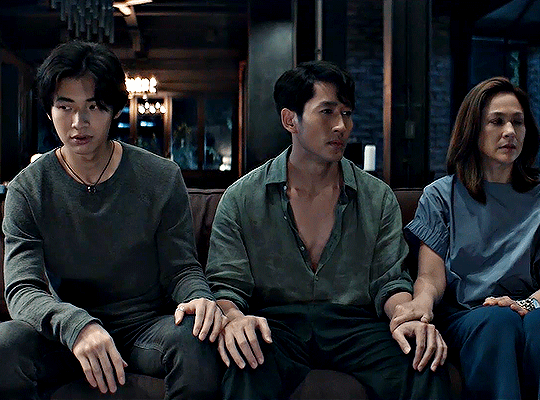
It’s winter and I’m huddled up in my house hiding from the cold weather, so obviously this is the perfect time to tackle another entry on the intergenerational family trauma challenge list. This week I finally watched 180 Degree Longitude Passes Through Us, a Thai drama about Wang, a young man just coming of age who is desperately seeking answers about his father’s death; Sasiwimol, Wang’s very complicated mother who does not want to dig up the past; Inthawut, his father’s best friend who has been hiding from it for years; and Siam, the black hole at the center of this story.
Before I dig into the trauma themes, let me just say that this show is excellent, if not for everyone. It has a very intentional style that makes it feel like a stage play—the writer is a playwright—and it’s basically eight episodes of very intense conversations. It’s not a romance and there’s an intellectualism in the writing that I found kept me at an emotional remove from the characters even as I marveled at how well crafted the dialogue is. And the dialogue is very important, which is why the translation of this drama is much stronger than we typically get from Thai productions—the words matter. It’s also loaded with visual metaphors and is all around beautiful to look at, and the three main performers are fantastic. I highly recommend it to anyone who likes theater, stories about complicated families, or beautiful and talented actors showing their work. And more than anything else, this show does incredibly strong thematic work and its messaging is on point: this is a story about how noble idiocy ruins lives.
So, with that said, onto the trauma! Spoilers ahead, and I am assuming anyone reading past this point has watched the show. Some themes you’ll see in this one: taboo, denial of queer identity, homophobia, filial piety, and lots of emotional manipulation. Shoutout to @bengiyo and @twig-tea for reading this to make sure I didn’t miss anything in this complex story.

There are two main sources of intergenerational trauma radiating down toward Wang: the absence of his father, Siam, and his intense relationship with his mercurial mother, Sasiwimol. The story is structured around Wang’s determination to seek answers about Siam—both who he was and how he died. He has grown up knowing a certain story: that his parents met and fell in love in college but divorced when he was young, that his father loved him very much despite not staying with his mother, and that his father was an alcoholic who died in a drunk driving accident. Shortly after his father’s death, his mom put him in boarding school so she could focus on her career and became a weekend parent to him—as she was not around to structure his day to day life, their relationship became more about her taking him on fun adventures and spoiling him when she had time off, treating each other as best friends instead of like a mother and son, and never talking about Siam. He has always suspected there was more to the story of his parents that he was not being told, and as he has grown up, come into his own queerness, and picked up on his mother’s casual homophobia and obsessive devotion to compulsory heteronormativity, his suspicions about the secret his mom was holding became sharper.
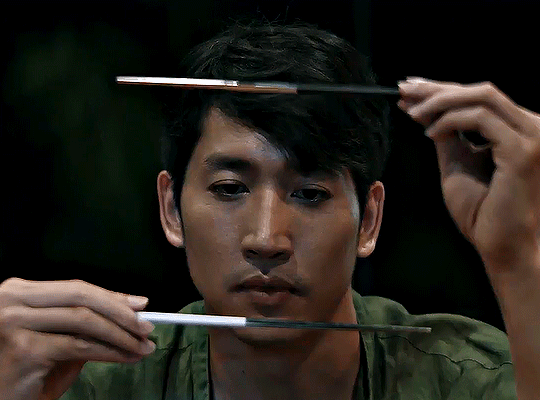
Enter Inthawut. Inthawut was Siam’s best friend, and with nothing to go on but a set of old pictures, Wang has an instinctual certainty that he is the key to the secret he’s seeking. And thus he engineers a way for he and his mom to “coincidentally” stumble onto Inthawut’s property and get invited to stay a few days in his isolated home, at which point Wang begins his campaign to figure out what the hell happened between Siam, Sasiwimol, and Inthawut at any cost.
One of the things I find most interesting about this story is how much the plot hinges on Wang going against Asian cultural norms in his pursuit of the truth. He is not respectful to his elders. He does not maintain filial piety and deference to his mother. He refuses to restrain his emotions. Instead, he is pushy and relentless and emotionally manipulative (all tricks we can plainly see he learned from Sasiwimol) and Inthawut doesn’t stand a chance against him. And so, because Wang explicitly acts against these cultural values, the truth comes out and the trauma is no longer suppressed.
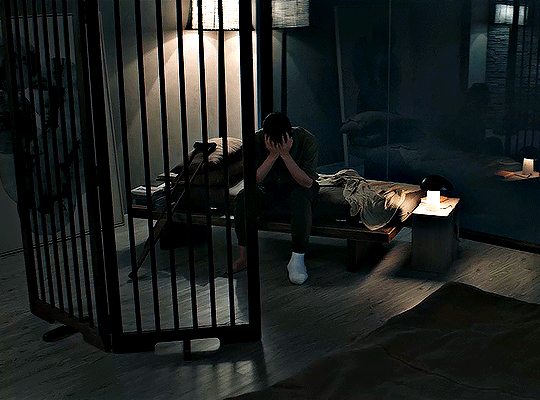
And in the end, it’s a simple, if desperately sad story: Siam and Inthawut were in love, but Inthawut was battling internalized homophobia and deep-seeded fear and so he relentlessly pushed Siam away and toward dating and then marrying their friend Sasiwimol. And when Siam, miserable in this heterosexual relationship he never actually wanted, finally snapped and confessed his true feelings, Inthawut rejected him and ran away to study abroad. Inthawut was running due to his own fear, but he also had noble notions of somehow protecting Siam from his own queerness and told himself that if he was gone, Siam would accept his heterosexual life. Of course, that did not happen, and in the fallout of this rejection Siam sank further into alcoholism and died soon after. Inthawut’s reaction was the exact worst fear of all gay people who work up the courage to confess to a friend they have developed feelings for: outright rejection, abandonment, and destruction of the relationship. And in his mind, he did this to Siam “for his own good,” a fairly textbook execution of the noble idiocy trope. In the aftermath, we see how Inthawut has isolated himself, part in penance, part in self-protection, and intellectualized his way to a romantic construction of his own cowardice that he tries to convince Wang is righteous.
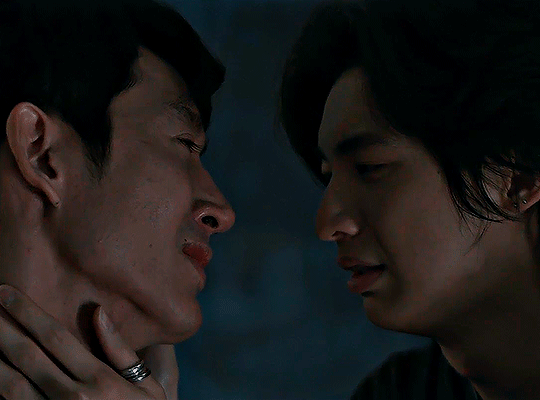
But Wang is deeply affected by how the denial of his father’s queerness ruined his life and is absolutely not having any of Inthawut’s self-denying bullshit, and this is where things get messy, as both Wang and Inthuwat seem to start seeing Wang and Siam as interchangeable and they develop an emotional entanglement that is deeply unhealthy, to say the least. Wang wants to understand Siam so badly that he starts to be him, and Inthuwat is so desperate to address his regret and shame that he starts to see Wang as Siam, as well. Wang also uses this attachment as a way to shock his mother and forcefully bring her real feelings about Siam and Inthawut to the surface. Despite Wang’s many loud protestations to the contrary, I don’t believe that he and Inthawut actually love each other. They are using each other to work out their trauma about Siam.
And they’re not the only ones! Sasiwimol seems to have her own psychological confusion about Wang as he relates to Siam, and their dynamic is very strange as a result. She refers to Wang as dua-eeng (and has taught him to do the same with her rather than calling her “mom”), a Thai endearment that literally means “self” but is often used between lovers. They have a very physically affectionate relationship that often had me grimacing in discomfort, and she clearly sees Wang as both a source of pain—because he is so like Siam—and her one source of comfort and happiness. She is a successful woman by any standard, but she’s also desperately lonely, hanging on tight to Wang as her only companion in a way that often veers into overbearing, and deeply wounded by her past with Siam and Inthawut. It was through her own friendship with Inthawut that she pursued Siam in the first place, and she clearly feels betrayed not only by Siam, but by Inthawut, both for getting in the way of her relationship with Siam and for leaving them. Her feelings about both men are complex and the story never fully spells them out, in part because Sasiwimol never does. Determinedly not thinking about what happened between them is a big part of how she copes, along with sublimating her suspicions into homophobia, which she perpetuates quite intentionally in her work via production of heterosexual romance propaganda.

Wang clearly loves his mother even as he is frustrated by her prejudices, her desire to control him, and her tendency toward emotional manipulation. He is a perceptive kid and he has studied her closely; he understands her very well and can often predict exactly how she’ll react to a situation. Which is why his decision to announce baldly to her face that he is in love with Inthawut—not only coming out as gay but declaring his intention to move out of her home and in with a man 20+ years his senior who is deeply entangled with her own trauma—felt very intentional to me. He knew what kind of reaction that would get from her, and he wanted it. And sure enough, Sasiwimol crumbles at this repetition of her trauma and the perceived disloyalty of Wang choosing Inthawut over her just as his father did. The rest of the emotion she’d been holding back comes pouring out, resulting in the three of them finally airing out everything that lies between them and everything they are feeling about the Siam-shaped hole in their lives. And once she breaks down, Wang is able to forgive her for the grievance she’s caused him and ultimately decides to remain filial and continue living with her, because he does not actually want to punish his mother for what happened to his father.

So, in the end, where did the story leave us with all this trauma? I can’t really say that any of these characters have healed, but I do think Wang kick-started that process, at least for himself. He got what he needed most out of this little scheme: deeper understanding of who his father was and why his life took such a drastic turn. He remains caught in the dysfunctional dynamic with his mother, and I’m not sure he’ll ever fully break out of it, but at least there is more honesty between them now about what they’re dancing around. She now knows he is gay and she has to accept it to keep him with her, and given that he has backed off from asking her to accept something much scarier than that, I do think she will find a way to make her peace with it. Inthawut is the character who seems to have progressed the least, standing firmly in his stasis and remaining determinedly alone with his pain, though the show leaves us with a note of ambiguity that suggests he may someday find the courage to move on.
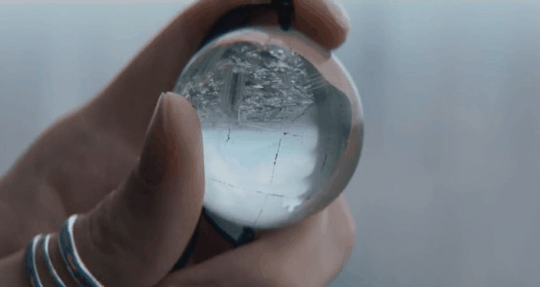
The messages of this work are clear. Internalized homophobia and denial of your own queerness are poison for your soul. Rejecting a loved one “for their own good” is an act of cowardice and selfishness, not an act of love. Hiding from and sublimating your trauma will never allow you to heal. Refusing to process your pain will only lead to you pushing it down on the next generation. Ultimately, this story told us that bravely looking ourselves and our trauma in the face and confronting our truths head on is the only way to begin to heal, and that running from them only leads to ruin.
#180 degree longitude passes through us#thai drama#intergenerational trauma challenge#shan shouts into the void
103 notes
·
View notes
Text
So clearly unpopular opinion but personally I actually found the way OFMD doesn't directly address homophobia to be sort of lacking at points. It would be one thing if the show was a set in a world where homophobia just ~doesn't exist~ but homophobia is an implicit force throughout the entirety of the show. This is not to say that I think the show should wallow in homophobia or depict a homophobic attack in a graphic detail. BUT the way the show just doesn't directly deal with Stede's sexuality leaves so many unanswered questions as to Stede's internal sense of self as well as the motivations behind some of his decisions.
In particular a question that hangs over the show is why did Stede leave his family? It's the prevailing question of the show, that we as the viewer slowly discover throughout the course of the season. And while I don't think Stede's sexuality is the only reason he left it feels like it was probably at least a factor in why he left.
So you have this show about an effeminate gay man. Who is bullied his whole life for being effeminate. Is forced into marrying a women because that's his role in society. Who is miserable trying to fit into this ridged box. So he runs away and forms a found family with other people who also do not fit in. He falls in love with a man. Is guilt tripped back into trying to fit back in that box society deems acceptable. Only to realise he still doesn't fit and to run again, but this time he's not running away, this time he's running to the man who he loves.
And then you tell me that the fact that the main character is gay is incidental to the story?
Like the show is textually queer. It textually acknowledges heteronormativity. It textually acknowledges toxic masculinity and the negative effect that has on Stede. But it only subtextually deals with the effect that homophobia and heteronormativity have on Stede's life.
Like I can't stress enough that I just have no idea what Stede thinks about his own queerness. Does Stede know he's gay before he leaves Mary? Is this the reason he leaves Mary? Is it just one of the reasons he leaves Mary? Did it have no bearing whatsoever on his decision to leave Mary? How does he feel about his sexuality? Is he taken aback by Calico Jack's comment about buggery because he has internalised shame about his sexual desires? Or simply because it caught him off guard? Or just because he's awkward about sex and that has nothing inherently to do with his queerness?
#like I like the show but this felt like a gap in the show for me personally ymmv#our flag means death#not history#historical fiction
282 notes
·
View notes
Text
Y'know what maybe I'm not done talking about Journeys queercoding actually. maybe I do wanna work out my literary analysis muscles for the sake of Pokemon protagonists. why not
To clarify, this isn't about me personally enjoying the ship between Ash and Gou. I do enjoy it, but I'm making an argument for potentially deliberate queercoding in the writing, I'm not necessarily just here to gush (though that may be a side effect)
I'm also a firm believer that actions or behaviors that we typically think of as romantic are only made romantic if that's how the people involved feel about it. I don't think romance is the only possible way to interpret their relationship.
But when it comes to predicting where a story might be going next, or figuring out what the writers are intending to hint at us, I gotta pull out my textbook of Romantic Tropes first to see what fits the bill.
And I'm sorry, but even if it's not the intended interpretation, you can't include all of these scenes:
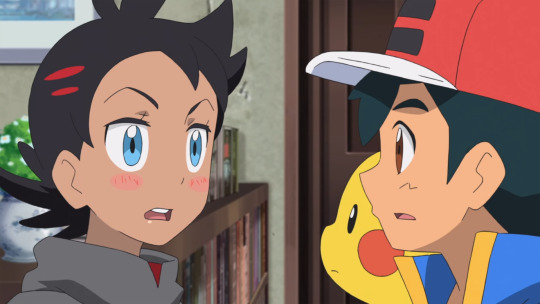

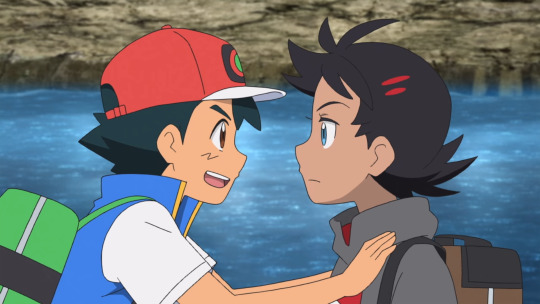


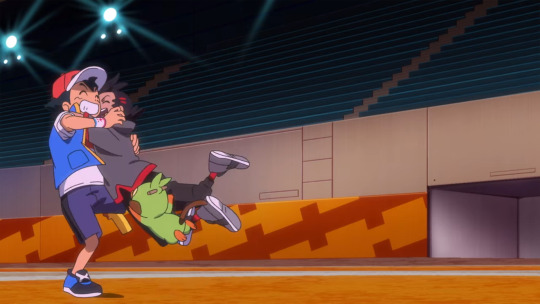
...and assume no one in your audience will think there's anything romantic happening here.
Of course, those are just the obvious visual interactions between them that can come off as romantic, to say nothing of the symbolic visual hints; the no less than four rainbows they've been under (one of which was reflected in Gou's eye), the two sets of heart-shaped pokemon that swam past them in a single episode which also had them falling under a rainbow, stuff like that.
But even all of that is pretty surface-level stuff. If the writing doesn't support a queer reading very strongly, then my argument for the queercoding being particularly intentional would fall flat.
Thankfully, the writing does support a queer interpretation, so I'm in the clear! Since breaking this part down will take a lot longer, I'm putting it under a cut.
So, right off the bat we've got the basic setup for the show. For the first time, the focus is primarily on Ash and one other person, as opposed to two or more people... despite having a third person in Chloe, who could easily make this into a trio dynamic, considering she's friends with Gou from the start. But they choose instead to make the core of the show about Ash and Gou.
This is even reflected in promotional material, where they'll often be placed closer to each other than Chloe:

Them being roommates is something I usually bring up as a joke, but it is worth noting anyway simply because it's another way the writers have decided they're going to spend almost all of their time together when they really didn't have to.
But now we gotta get into the real Writing Choices(TM) that are the meat and potatoes of this analysis, such as: making brief allusions to the idea that they might like other guys, too
One way to build up a character's orientation is to show them being attracted to people in shorter instances before giving them a main love interest. Think Luz from The Owl House; she had expressed attraction to both boys and girls before she got a girlfriend or started wearing a bi pin.
Likewise, this is Ash when he's thinking about Leon after seeing him battle for the first time:

I kid you not, he keeps up this blush and zoned-out expression for a solid minute, so caught up in thinking about how cool Leon is that he doesn't even think to eat the scones in front of him.
Now, Ash is a person frequently characterized by his love for food, and in previous episodes he had expressed a particular adoration for Galar scones, so this is pretty unusual behavior for him.
So unusual that it's. literally never happened before, to the best of my knowledge?? I don't think it takes much analyzing to realize that, even if it was brief, you could easily take this as Ash having a celebrity crush on Leon.
(There's even pink flowers in the background but that's probably less important)
Meanwhile with Gou, his "setup crush" in this scenario would be Horace. These two have a whole episode dedicated to their first meeting and the bond they forged, and how that turned bitter on Gou's end when he gets stood up right as he thought he was finally making a friend.
What sets this up for a romantic interpretation is largely the framing of things towards the end of the episode:
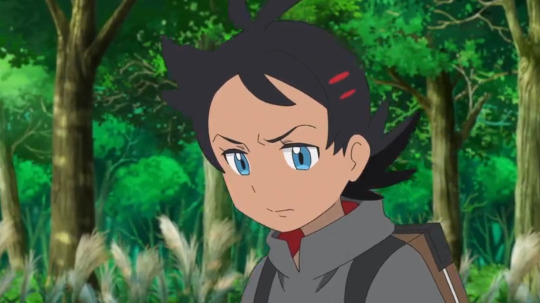

"Why do I keep thinking of him" is historically not the most platonic thing you could be bitterly thinking to yourself while you remember stargazing with someone, even if I do stand by my statement earlier of nothing being inherently romantic by itself
The end of the episode also implies that the feeling is mutual, if this shot is anything to go off of
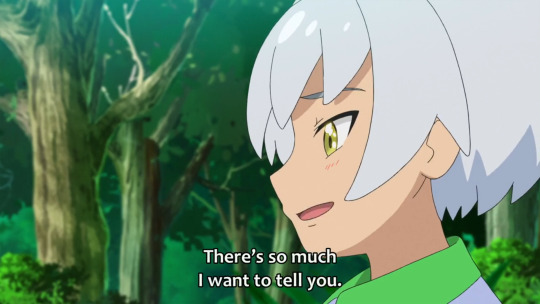
(It's just a very shoujo manga-esque frame okay there's no way I wasn't going to point it out)
And the ending scene is two Celebies looking down happily at the two of them while the narrator talks about how pokemon form "many different kinds of bonds"

Many kinds of bonds, huh? Wonder what he could possibly be implying there
Okay so we've got orientation buildup, next in line is this. suspiciously consistent trend of characters who are close to Ash telling Gou to take care of him, or even going out of their way to test him to make sure he's good enough to be his rival or friend.

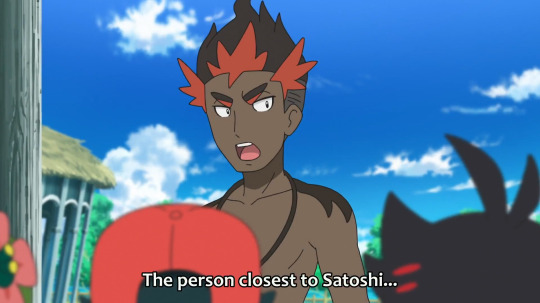
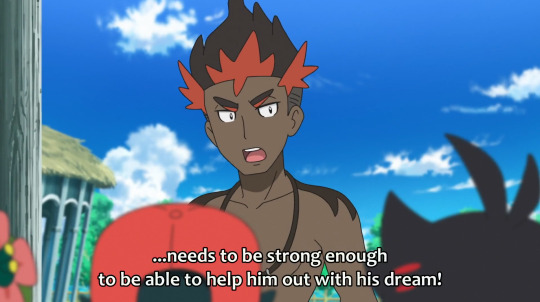
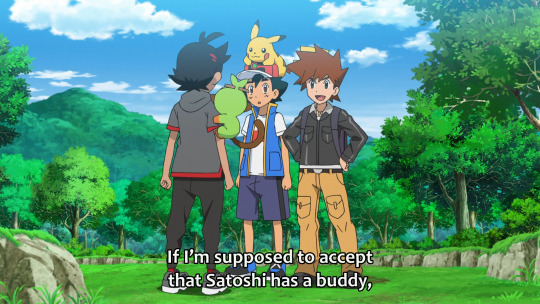

Gou himself even echoes the sentiment completely unprompted once, which says even more to me that they're trying to make a point out of this:
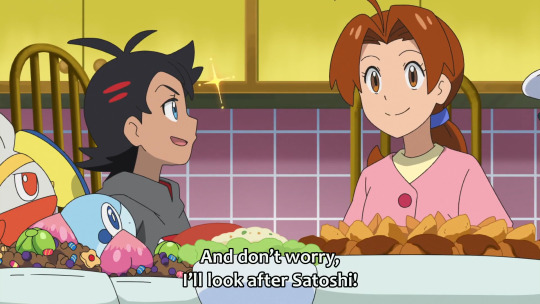
And here's the thing. None of the other companions have ever undergone this sort of treatment. Nobody questioned whether or not Ash's friends were good enough to hang out with him before, so why now? Why Gou? What makes him different?
Kiawe is relatively easy to explain because (from what I can tell) he's just Like That about rivalries, but why the addition of describing a rival as "the person closest to Ash"? Why does Gary suddenly care about the quality of Ash's buddies when that was never really a concern for him before?
Well gee I don't know about you guys but to me, this feels like the trope where someone's friends and family all start scouting out the guy they're interested in (or who is interested in them) to make sure they won't like, break their heart or something. And despite my best efforts, I'm struggling to see how this wasn't the writers' intention behind these plotlines.
Gou telling Ash's mom that he'll look after Ash on two separate occasions as opposed to the initial one also feels like an easy parallel to someone promising their love interest's parents that they'll be a good partner.
To my understanding, that isn't traditionally something friends also have to promise, even if there's more justification here as Ash and Gou are traveling around and getting into chaotic situations regularly.
So, with all this in mind, it kind of reframes the stuff I mentioned earlier, doesn't it? The blushing, the hand-holding, the spin hug that I'm never getting over, the frequent appearance of rainbows and the heart shaped Pokemon (Luvdisc if you were wondering)... it feels a lot more intentional once you take into account the bigger themes in the writing.
And once you start looking, it keeps piling up. The way Gou hurriedly says that he totally didn't want to help Ash out or anything after Scorbunny gives him a knowing look, like how most tsundere tropes tend to play out:




Or the specific way Gou is taken aback by one of Ash's compliments before trying to play it off by looking cool, only to be comically shocked when Ash gets distracted by something else:
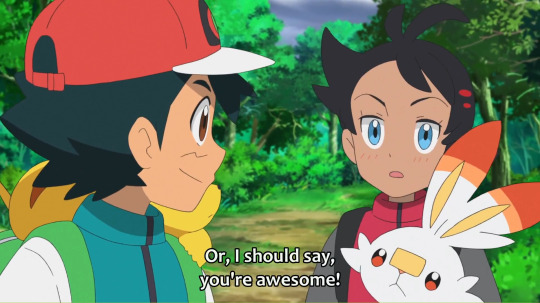

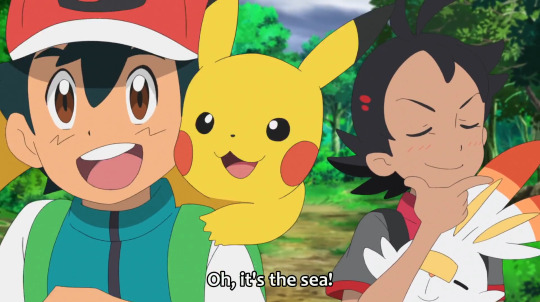
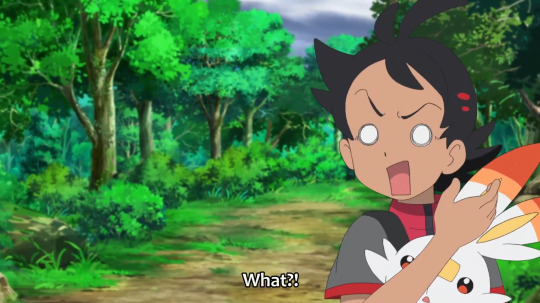
I could go on but I'm running out of image space and I think you get the idea.
Ash's side of this whole thing is admittedly a lot more subtle than Gou's (*cough* because he's arospec) which is why I haven't gone over it much - my aim with this post was not to go too far into speculation territory - but we at least have marketing on our side for that


Gee Ash how come Animedia let you feed Gou two pastries
Anyway, in conclusion: I ran these two through the literary queerometer and the results were positive, thanks for coming to my TED talk
#pokemon#pokeani#anipoke#pokemon journeys#ash ketchum#pokemon gou#journeyshipping#satogou#analysis#meta#Can you tell I started this at a reasonable nighttime hour and finished at 3am#XD#TAKING THESE SCREENSHOTS TOOK SO LONG#especially since I had to backtrack and edit for a lot of them#Finding the animedia posters in decent quality wasn't exactly a cakewalk either
820 notes
·
View notes
Text
Why BUB actually fits into OOO's catalogue
Bump Up Business has been criticised for many things, and don’t get me wrong, it’s far from perfect, but there is one question I have heard a lot: “Why did OnlyOneOf of all people choose to do this? Doesn’t this show play exactly into the thing we have been defending them of?”
My own answer to this is yes and no. But let me explain.
In this I will not be discussing what the writers had in mind, because I don’t know them. But I’ll talk about why I think it makes sense OnlyOneOf would tell this kind of story, whether they actually had any say in choosing this drama or not.
The main argument for most peoples' criticism I’ve seen is “This show is about/glorifying queerbaiting.” But is it really? Both of the characters are already queer. Jihoon has dated at least one man and is very aware of his own sexuality. Eden is quickly established as being very insecure in his own sexuality, not because he’s straight, but because he’s queer and finds that hard to accept. So the show is about queer characters.
Okay, so how does the queerbaiting fall into this? Obviously there is queerbaiting present. Their company practically forces them to do it. Eden is very reluctant, but agrees after the company gives him an ultimatum. Jihoon is less reluctant, but also in a tight spot. He has fallen off and this is seemingly his last chance to save his career, something he wouldn’t give up even for the man he loved. So the characters take no pleasure in the queerbaiting, but is it a problem to them? Yes, actually. It is made clear that they have trouble telling apart what is real feelings and what’s just work. In episode 4 for example Jihoon asks Eden if he is struggling with their concept after Eden revealed how insecure he is in his sexuality. The question comes from a place of caring and honesty. Eden then answers that he is okay because it’s "just work". Since emotions and their hidden identities are now part of their work it gets all muddled and confusing for them.
You might say now “But that’s not the problem with queerbaiting! They’re leading their fans on!” And from a fan’s perspective I agree. They are leading them on. But this isn’t about fans, this show is about idols. What would it be like for a queer idol to work in an industry where you are urged to act queer but to never be queer? How would that affect your personal life?
In the drama the queer characters hide their identity. Even after Hyunbin spread these awful rumours about Jihoon, they don’t reveal their relationship. Evidently having rumours about being with women is still better than revealing that you’re gay. The entire time they keep any real relationships under wraps.
On top of that, in a way Eden has to out himself for his job. Even though he of course isn’t allowed to be actually queer, acting this lovey-dovey with another man in public sure must feel like he’s coming out and he is clearly uncomfortable with that. Interviewers and netizens are constantly questioning their relationship as well. Are they gay? Are they straight? Do they naturally act that way? Is the company forcing them? Having all your actions be scrutinised and dissected like this, especially as a closeted queer person is terrifying.
Once again I’m not claiming that the writers wanted to represent queer idols’ struggles, but I think you can understand how this might be able to be read that way, especially by idols themselves.
Now how does this fit in with OnlyOneOf’s usual work, besides the obvious queer element? For that I’d like to remind you of June 2022. That is the month we started off the undergrOund idOl project. If you’re like me, then that name probably made you question it. What does it mean? I remember theories about it being about struggling as a relatively unknown group and things along those lines. Luckily they gave us hints in several articles by letting us know that the series is about “the inner side of idols who shine on stage”. Okay, cool! So is it about struggles with fame? Like a glimpse behind the mask? Let’s look at the videos! Hm… Not much about idol life here actually… They’re all just.. queer? How curious. Almost as if they want to highlight the queerness so many idols or celebrities have to hide?
So OnlyOneOf, a group whose behaviours and sexualities are constantly being dissected and who is famous for telling and highlighting genuine queer stories, even connecting those stories to what idols have to hide, choose a drama that is about queer idols who have to navigate their queerness in an industry that demands “fake queerness” but has no room for real queer people. This doesn’t actually seem that surprising to me. Does it to you?
Last comments:
I don’t think that BUB is a critical masterpiece tastefully portraying the harsh reality of queer celebrities. I think that the producers and writers did not do a good job and that OnlyOneOf’s own work is a lot better. But I can absolutely see how this story fits into the larger picture and why this could be appealing to them. I don’t know if they even had any say in doing the drama to begin with. But I just wanted to provide a different point of view. Maybe someone found this interesting at least <3
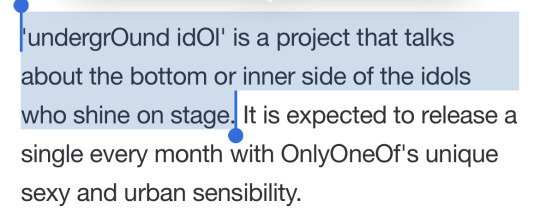
39 notes
·
View notes
Note
What are heaven will be mine & coquette dragoon?
oh my goodness, thank you for asking!! the short answer: they are incredibly good visual novels that I highly recommend, especially if you're a fan of mecha, sci-fi, great world building, yuri, and generally just amazing art created by transfems
long answer:
heaven will be mine (aside from being where I got my url) is the second VN made by worst girls games, best known for their first outing, we know the devil (also an absolutely amazing game). hwbm tends to ask a bit more from the reader than its predecessor- while wktd almost exclusively featured three characters and dealt with rather plainly stated themes of alienation, loneliness, and religious trauma, hwbm presents a setting cloaked in metaphor where human will literally shapes the universe and psychic mech pilots read spacetime like a narrative.
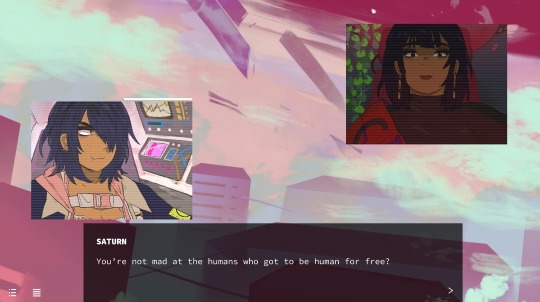
the cast is bigger, with the three routes allowing insight into each of the three main girls in addition to members of the factions they belong to, all in service of a beautiful story about queer people connecting with each other and finding/making their place in a world that would want to deny them their happiness (and a lot of other things, but I'm simplifying some here). begging to be replayed over and over, i've had different characters and details stick out every time ive played through the game, while also gaining a deeper understanding of and appreciation for hwbm's characters and setting. I've loved hwbm and wktd for years and expect I will for years and years to come, which, incidentally, is why I got a pair of tattoos based on these games LMAO. in other words: they're fucking fantastic and hit like few other things out there, imo
coquette dragoon is one of those other things, because holy shit does it excel at hitting incredibly specific and relatable emotional beats that are liable to absolutely tear you apart. created by ivy burgeroise, who (by her own fantastic description) makes art for sad perverts, coquette takes place during a seemingly endless war between the lilac fleet and the duchy of lucia, two spacefaring societies inhabited by animal people who have very differing opinions on magic.

focusing (so far) on xiomara rosales of the lilac and lady honey rose of the duchy, coquette explores painfully human stories from both sides of the war. (to that point, I'd be remiss if I didn't advise you to look out for the content warnings- coquette gets into some very heavy stuff and speaks about it very frankly and honestly, which is to its credit imo but i also understand that that is not something that everyone is in a space to deal with.) more than anything else, I feel, coquette is a work that puts words to feelings that you'd never before been able to describe, and, through the vulnerability of its author in making something so emotionally honest, makes me want to be more openly and happily myself. all of this in a story that examines war, exploitation, and the societal structures that prop them up, among many, many, many other things. I could keep talking in circles gushing about it, because I am so so obsessed with what's been released so far and so indescribably excited to see how it progresses in the future, but to keep myself from going on for too too long i'll cap this off with a tweet about coquette that i frequently think of and is one of the best recommendations I can offer:
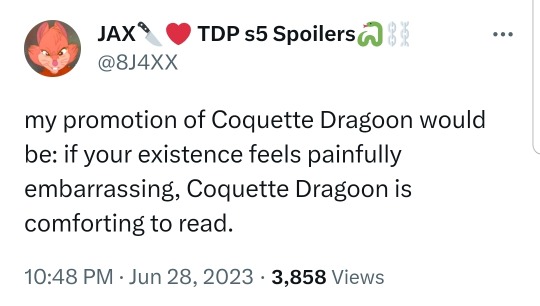
OH and also coquette has wibbleburger, which, as we all know, is your favorite
#(the joke is that wibbleburger's slogan is ''it's your favorite'' i am not arbitrarily deciding what is or isn't your favorite)#anyways. i dont know how else to say this but theyre both absurdly good and make me cry a bunch#heaven will be mine#hwbm#coquette dragoon
116 notes
·
View notes
Text
I want to rate the silly ships like people have been doing so I will (my memory of them in canon is so bad)
Percabeth: 9/10
by far one of the best ships in pjo, but there are times where the "tough love" is just too tough for me
Jiper/Jasper: 3/10
I don't remember much about this ship at all but it was a little cute? It did feel very fabricated with it being forced by Hera & I found Piper's heart eyes at Jason 24/7 annoying as hell-
Frazel: 4/10
it was cute, but that could just be the characters lol I wish we saw them more developing their crushes on each other instead of Percy showing up and being like "oh these guys like each other lol"
I don't like the age gap at all tho, it might just be like 2-3 years but when you're a teen that's a BEEG difference in brain development and maturity levels etc.
Caleo: -100/10
no, just no. I can not even begin to explain why it is so bad and toxic. Richardio really saw Percabeth pop off and was like "let me do that again!" and made the most toxic ship i could find fr. Me and my homies hate Calypso frfr. Even if all their interactions were rewritten so that Calypso isn't constantly talking over and shutting down anything and everything Leo does I dislike it still because it just plays into the damsel in distress x savior knight which i do not like at allll
Solangelo: 1/10
they had slight potential in blood of olympus (and that's me being nice) but otherwise everything after that just felt so stale, fake, cringey, and toxic.
Will's character lacks,,, well, character. If you want to construct a relationship with characters you need them to be people in the first place- and not just a "__'s boyfriend!"
It also just feels like those 13 yr olds in school that are so obnoxiously lovey in class and then they break up after a week you know what i mean? I have more to say but these are getting long-
Solangelo (in fanon): 8/10
Hell yeah. Most of the fan content ive seen from solangelo has been DRASTICALLY better than canon, they actually make Will feel more like a concrete person, they give proper chemistry/shared interests to him & Nico, and overall it just flows better? Idk (big fan of when people make Will freakier than Nico, my favorite flavor of Will)
Pernico: 2/10
I can see it? But I don't like it. They have so much built up miscommunication and bad memories from each other (Percy literally tried to strangle Nico to death) also the same with Frazel; I don't like the age gaps while theyre teens
Jasico: 8/10
I get this one, but I really see them as more like besties, so I don't partake in it too much. Otherwise it's great.
Valdangelo: 10/10
I am biased, but good looorrrd the potential :(( the similarities of them, both being the outcasts and just heguehfh i love them
Valgrace: 8/10
same as Jasico, i see them as bros way too much but I don't deny it's a banger ship too.
Shelper: 1/10
I feel the same way with this as i do Solangelo, there's no character for Shel, it's just Piper and "Piper's gf!!" Rick is so bad at writing queer rep, he just picks main characters and slaps a random blank slate character onto their side and thinks he ate, but he's just desperate for queer brownie points.
Feirrochase: 10/10
I DON'T REMEMBER THEM BUT I LOVE THEM!!
#pjo#percabeth#jiper#frazel#caleo#solangelo#pernico#jasico#valdangelo#valgrace#shelper#fierrochase#crit#slo rambles#pardon me if i lied my memory is bad 💔 i havent read these books in 5 years
47 notes
·
View notes
Text
Choose your favorite!

Vote in the other polls!
What fans say:
Inside Out:
Besides the fact of "being a Pixar movie", this movie is a masterpiece, and it has really impacted me. Its message about accepting that "bad" emotions such as sadness are part of life and have its positive side and that "good" emotions like joy can be negative and toxic is really important and one that I'm still trying to internalize 8 years since I first watched the movie.
Wolfwalkers:
The animation is absolutely gorgeous, with a unique style. The music is wonderful, the story is touching. What's not to love!!!!!!
It's beautiful! If I'd watched this as a young girl it would've done something to my brain, in a good way. It's about being stifled by England and those in power, in 1600s Ireland. It's about little girls becoming best friends. It's really sweet, and wonderful. I love the scene where Robyn gets to really have fun and play as a wolf.
Wolfwalkers has beautiful stylized animation. The story is about conflict between the oppressive English colonizers of an Irish town, and their old ways of living in harmony with the forest. When the main character Robyn is in the town, the style she and the backgrounds are drawn in have an angular style made up of flat shapes that don‘t turn in perspective, similar to a woodcut print, showing the limitedness of the town worldview. When Robyn is in the forest at first she is drawn in the town style, but as she is introduced to Mebh, the style shifts to a loose, pencil-lined style with soft shapes and forms that turn three-dimensionally. Later, at key points in the story, Robyn shifts between these styles to reflects whether she is conforming to or breaking away from the town‘s rigid system. It‘s a beautiful way to subtly tie animation to storytelling. I also of course love the story for its queer, environmentalist, and anticolonial themes. It‘s an excellent movie and everyone should see it.
It has some wonderful animation, especially in the wolf scenes, and tells a story that pulls from the history of the English colonisation of Ireland.
The art style is gorgeous and the story is lovely.
It is the most beautifully done 2d animation I've ever seen, beautifully drawn and with such interesting stylistic choices for the backgrounds and the character design, the best shapes. Perspective is really played around with in wide shots that show the town, giving it an even more boxy and closed-off feel to it! My favorite scene would have to be when the song Running With The Wolves by AURORA plays. It makes me cry like a baby they're so beautiful and playful and free and learning to have strength and courage.......
It tells a really beautiful story about identity and friendship and being brave enough to stand up to your oppressors
The animation is gorgeous and well-utilized to convey tone/mood and also little wolf girls are valid and the scenery is [chef’s kiss]
The animation is really stylized which I like. The art style is one-of-a-kind, changing slightly depending on what's happening in the story. Like, for example, Robyn, one of the main characters in the story, started being drawn using cleaner lines when she was still "civilized", in contrast to Mebh, a girl from a tribe that lives in the forest and can turn into a wolf. As Robyn started becoming "wilder", spending time w Mebh, the lineart becomes more sketchy. It's just a really really pretty film. The story is also really really good. The characters are complex and develop throughout the movie. You can understand why Robyn's dad acts the way he does, but still allows him to see the errors in his ways. Also Mebh and Robyn are just fuckin adorable. This movie made me cry so hard and I hardly ever do that Also the soundtrack? MYGOD. perfect. Favourite scene is definitely Mebh and Robyn's wolf scene where Robyn was learning how to be a wolfwalker. The music and animation in that is so good. Idk i really i really love this movie bc it feels so... ALIVE. It uses the animation medium really well, doesn't shy away from the 2Dness and stylizeness of it, which I wish more animated stuff would do.
The animation !!!! Is so gorgeous !!! The art style is so gorgeous, in some places super details and in some moments mimicking medieval styles with symbolic (rather than realistic) perspective, it's so so so beautiful. The music is also amazing, and the story is beautifully put together, it will make you weep.
126 notes
·
View notes
Note
Do you have the source in which Luffy was confirmed aroace? I’m making a project on the ace and aro communities that includes a list of aro, ace, and aroace rep in media and I can’t find where it was confirmed, but I hear everyone say he is. Thank you.
luffy is very very much aroace coded but neither he nor the author have ever directly said the words "luffy is asexual" - one piece's canonical queer rep is limited to transgender characters
that being said, here's the relevant passages, and some context if its needed:
in chapter 516/episode 411, luffy stumbles across boa hancock, the worlds most beautiful woman, in the bath. she has an ability to turn people to stone when they feel some amount of "love, lust, or adoration" to her; ie. when they are attracted to her. heres how it goes:
youtube
this is the first time hancock meets a man who isnt affected by her power. it basically suggests that, by not turning to stone, hes not attracted to her at all.
eventually, she develops a crush on him, and she wants to marry him, which he outright rejects (chapter 598)
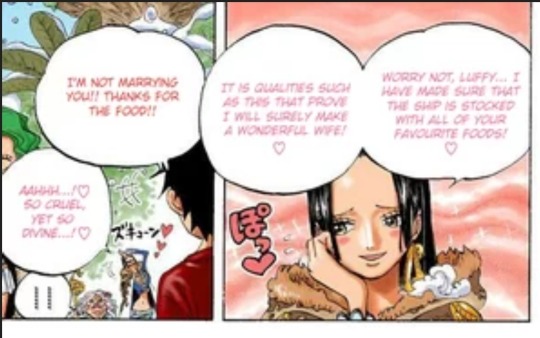
in regard to the "mero mero" moment, a fan noticed a discrepancy, and asked the author about it in the SBS corner from volume 54. luffy had previously responded to the naked body of a woman the way all the other guys did. oda decided to blame it on luffy imitating his friend
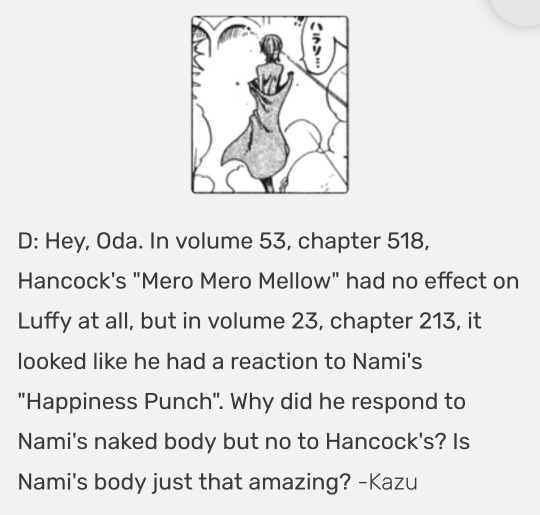
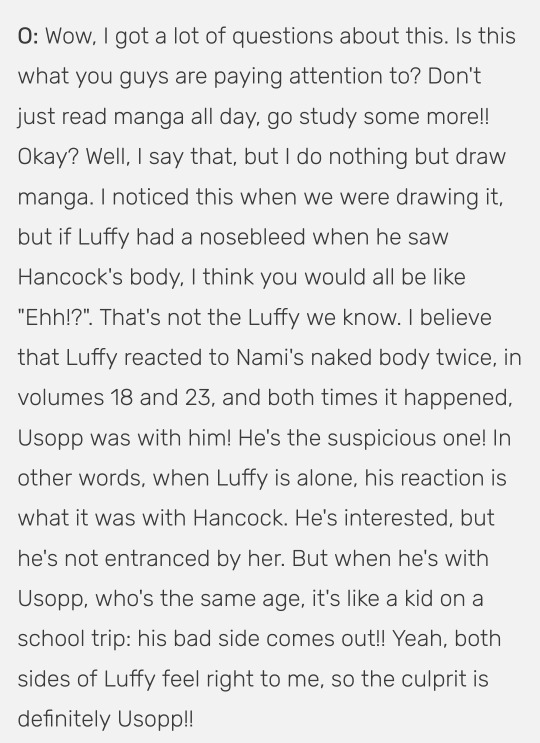
"That's not the Luffy we know." "When Luffy is alone, his reaction is what it was with Hancock. He's interested, but he's not entranced by her." Luffy acting in a certain way because Usopp does - going along with the mood of the moment, or performing, or however you want to say it - feels awfully aspec to me. It's definitely a common aspec experience to try and force yourself into amatonormative - or, in this case, I guess allonormative? - behavior.
In the SBS for volume 88, oda was asked about why luffy called a woman a "beauty" at one point. The response:
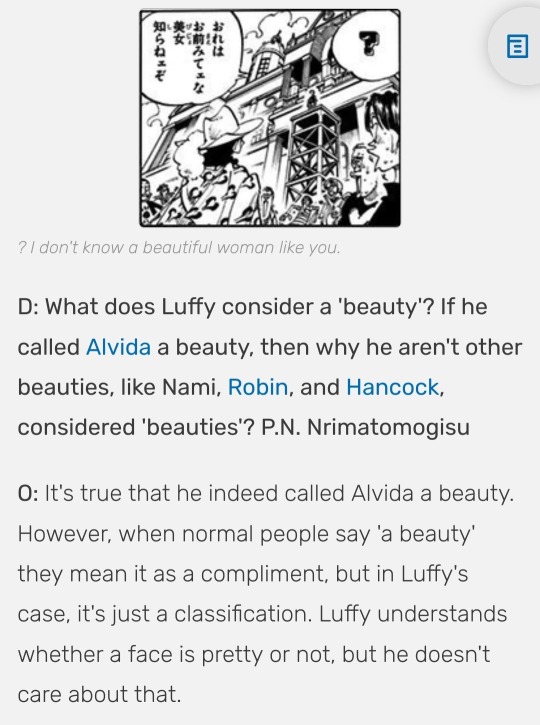
Luffy understanding physical attractiveness as a classification, understanding it but not caring about it - that suggests he probably doesn't experience aesthetic attraction (appreciating someones appearance, disconnected from sexual/romantic attraction). this definitely speaks to my experience as an aroace individual.
also, this isnt necessarily evidence for luffy specifically, but moreso a general answer - in the SBS for volume 34, oda was asked if there would be romance between the main characters, and he brushed it off:
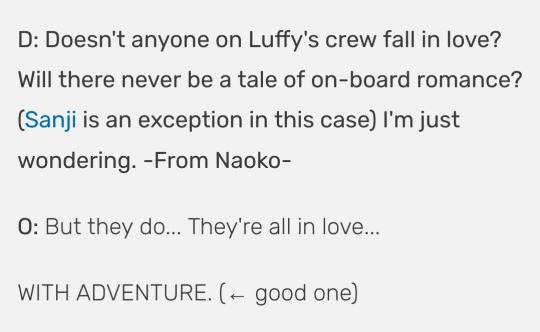
my impression, personally, is that Oda is generally fairly uninterested in pursuing any romantic relationships between his main characters.
in conclusion, I personally feel like the evidence here suggests that luffy is aroace, or at least aspec, given some of Oda's wording (which is probably a little up to interpretation, given it's been translated from japanese). His answer in volume 54 has always felt like a retcon to me, like Oda only came to a conclusion of sorts on this when Luffy met Hancock, and had to go back and find some reasoning for why Luffy would have responded that way. Luffy, more than anything, wants to have an adventure, and romance and sex aren't part of that for him.
I'm not gonna try to police how people view Luffy. it's not healthy for me to do that - luffy and his aroaceness is something that's very very personal to me and itd be way too messy. In addition, in the past I've had people point out that this evidence would only necessarily suggest luffy isnt attracted to women, and he could be gay; I personally don't see him that way, and I seriously doubt Oda would make that choice in canon, but people can do what they want. I think, however, it's pretty telling that a lot of aroace and aspec people see themselves in him.
This morphed into something of a modern take on my thesis here instead of just answering your question; sorry about that. I'd be interested to see your project when you're done, if you're able and willing to share!
102 notes
·
View notes
Text
thinking about a discussion i saw this morning (please accept these very half developed ideas!) and i do think that part of the reason that the silmarillion fandom pays less attention to female characters (outside of misogyny, which is also a huge part of it) is that basically every single woman is a wife, and most of them are mothers?
i can't help but notice that the majority of popular male characters are unmarried and childless (looking at ao3 statistics, with the notable counter-examples of elrond, who is very often a child in fanfic, and feanor, arda's most divorced elf). which is possibly because many of the most influential male characters in the silmarillion are unmarried and childless, but it does feel a little disproportional.
some very disorganized thoughts on this phenomenon, presented with very little confidence because i'm just bouncing ideas around:
queer ships are far more popular in the fandom as it stands now, because it is heavily queer, and there is very little woman-to-woman interaction in the silm. the majority of the most popular m/m ships are based on some meaningful interaction between the characters. many of f/f ships involve characters that have never met (indis/miriel, finduilas/nienor) or have very limited interactions (thuringwethil/luthien).
------------ this does not explain, however, why m/m ships between people who have no interactions at at all (erestor/glorfindel, celebrimbor/maeglin, etc) routinely get more attention than f/f ships.
basically every woman's story is defined in relation to her husband's (and usually children). idril, i think, is the semi-outlier here (and to some extent aredhel). but even then -- the majority of the male characters, even if they are married, have a lot of story outside of their marriage/relationship (so much so that characters like finrod, fingon, and angrod can go from married with children to unmarried in some drafts have very little changed!). can that be said of any married female character in the text? i don't think so. once a woman in the silmarillion marries and has children, the progression of her story is almost always defined very heavily by her relationship to her husband and children. fingon rules the same and dies the same whether or not he has a wife and son -- idril's story would be very different without tuor and earendil. feanor gets to do a lot of things after his marriage to nerdanel -- fingolfin does very much after his marriage to anaire. both of the women disappear from the story once their marriages are no longer relevant.
---- here i will note that some male characters ARE heavily defined by their relationships to their families. turgon, whose motivations are very heavily based around the death of his wife and protecting his daughter, comes to mind. so does thingol, whose wife and daughter are equally central to his story. that said, neither of those characters is popular in fandom.
to expand on the previous point: characters whose main stories are romance stories, including male characters, do not tend to be very popular. earendil has just under 700 works on ao3. beren has just over 500. (elwing and luthien, for reference, have just over 700 and 800 respectively). despite our love for shipping, the fandom seems to be disinterested in parts of the book with a heavy romance focus. is it possible that the fact that nearly every single woman having a prominent romance arc "turns fandom off" them?
only four unmarried women come to mind as counter examples (watch me miss someone obvious). these are finduilas, haleth, findis, and lalwen. findis and lalwen are footnotes that disappear quickly from the story without being given much to do (which doesn't stop us with erestor or caranthir, but still). finduilas, despite being unmarried, is heavily defined by a tragic love triangle. haleth is the notable exception -- i would say she is more popular in fandom than many women, but less than most male characters. the only real explanations i can give for her getting so little fandom attention is misogyny/bias, the general fact that humans in the silmarillion get less love than elves in fandom, and and possibly her having little connection to any of the other popular characters outside of caranthir.
that being said, i do still think misogyny/the general fandom tendency to ignore female characters in favor of male ones is responsible for a good chunk of the difference. i also really welcome feedback on these thoughts because i feel very uncertain of them. the more i think about it, the more i can find counter-examples and outliers to a lot of the trends i'm talking about here -- perhaps i overgeneralized. is there no coherent analysis to be drawn here?
currently leaning in the direction of "this is a vague but not all-encompassing trend in the text, which affects fandom to some extent without explaining the preference for male characters and m/m ships entirely."
#can you tell i'm procrastinating schoolwork LOL#lena speaks#the most tentative of metas#is this even coherent. does this say anything meaningful
63 notes
·
View notes
Text
I’ve been thinking a bit about why Izzy’s death, while sad, still felt like a “good” end for him to me and then I remembered…Felix Gaeta’s entire tragic arc in Battlestar Galactica.
In a show with a lot of morally grey characters making morally grey decisions, it still wasn’t popular to be a Felix Gaeta fan but I WAS. He starts out an idealistic math nerd in a sea of hot shot pilots, a Star Trek character who got lost in the hellish world of BSG.
Gaeta’s storybeats are strangely similar to Izzy (betrays the heroes, unhealthy infatuation/admiration of his boss, getting to Showcase His Singing for Plot Reasons, leg amputation, early death, metatexually queer). But the story beats for Gaeta follow a path of deterioration, not growth. Izzy’s end is bittersweet. Greta’s end is…bleak.
Directly opposite of Izzy, Gaeta starts off idealistic, only to get more jaded as war, occupation, and disillusionment eats away at him. He does what he can to secretly resist within the oppressive regime of the enemies, after throwing his support behind his former hero who quickly reveals himself to be a useless puppet. He then chooses mutiny rather than ally with those enemies later on (and picking yet another shitty leader to follow). And for his transgressions, Gaeta loses his leg, spends his final days in agony, and gets executed as a traitor. (He’s also revealed to be queer in the bonus features, but we never see it in the main show, so whether or not is counts as Bury Your Gays is debatable.)
In comparison Izzy’s end, after completing a full redemption arc, accepting and embracing queer joy in Calypso’s Birthday, surrounded by people who’d grown to appreciate him after he opened up, in the arms of his closest companion after being called his family…
I don’t know, people are of course free to feel however they want. BSG and OFMD are tonally very different shows, but remembering Gaeta’s whole tragic arc and abrupt end made me appreciate Izzy’s ending even more.
…I still kinda wish he had lived, though
#battlestar galactica#felix gaeta#ofmd s2#ofmd s2 spoilers#izzy hands#the izcourse#(For the two other people who liked Felix Gaeta out there)#(and also watched OFMD)#…this might be one of those posts that is solely for me#ofmd meta#ofmd spoilers
44 notes
·
View notes
Text
I got a Q that came accidentally as a DM vs. an ask, so I'll just re-state it here and then answer it: "Why do you think Rohan wasn't concerned about Théodred being single and without children? Shouldn't they have wanted another heir to keep his line going if/when Théodred died?
So, first off, this does seem weird on the surface, at least relative to how many actual monarchies have worked. Queens have lived or died, wars were fought, and entire nations fell when a monarch failed to produce a clear heir. So you'd think that Théodred, being in his 40s, would be considering that need. But maybe not! As shown in the Théodred fic I’m in the middle of rolling out, my personal HC for him is that he held out against marriages of convenience or alliance to have a real love match instead, and he didn't find that until close enough to his (untimely) death that the marriage itself never happened. But he also just didn't feel the call to parenthood—not all of us do!—and was more than happy to pass everything to Éomer and his descendants when he died. After all, he loved Éomer as something between a brother and a son, and that's classic heir territory. So he didn't need to rush into marriage or kids because he was comfortable with Éomer as his own heir and had made that clear enough that it was accepted.
Canonically, of course, there's no evidence for that. But there's also no evidence that Théodred's situation is all that odd in late Third Age Middle Earth. There's almost no one of any significance in the story who is married or actively raising children until the very end of ROTK. Galadriel, Bombadil, some minor hobbits, Beregond...these folks are the exceptions, not the rule. Everyone else is unmarried or widowed (or whatever you call what happened to Elrond), and the younger generation is childless—even the other hereditary heirs to power: Boromir, Aragorn, Legolas, Elladan & Elrohir, Pippin, etc.
There’s a range of reasons for that. We're told dwarves just don't put a lot of priority on marriage. The elves are fading, so they've got other things on their minds, and they tend not to have children during times of war and strife anyway. Gondor is described as a land “falling into dotage” and decreasing in population so there’s almost an element of fading there, too, though of a different kind. The Shire is the one place where there does seem to be a lot more marriage and childrearing happening, so it's probably more of a coincidence that our 5 main hobbit characters (incl. Bilbo) just happen not to be among them at the time of the story, either because of age or queerness or some other reason particular to just those individuals vs hobbit culture as a whole.
That leaves Rohan, and I'm not sure I have a super satisfying answer. Théoden's family does appear much less uptight about issues of inheritance and power and heritage than you'd think. His father very nearly abdicated the throne, and Théoden himself is kind of shockingly casual about the transfer of power when he tells the Rohirrim to just "choose a new lord as you will" should both he and Éomer die in battle. (Were we one hot nephew away from Rohan having the first democratically elected head of state in all of Middle Earth??) If the royal family felt that way, perhaps they were just reflecting a broader culture that was more comfortable with the idea of power not always going linearly from father to son and so setting up those lines through marriage and babies was not as important to them. In that case, Théoden might have been willing not to force his son into a marriage he didn't want, and Théodred may have felt more free to take his time deciding on things. All of which brings me back in the direction of my own HC, so I guess that feels satisfying enough to me!
#lotr#lord of the rings#answered asks#rohan#théodred#theodred#éomer#heirs of middle earth#there are shockingly few spouses and children in the story!
16 notes
·
View notes
Text
TC tag game
Thanks for the tags, @spudodell and @renaultphile, sorry it's taken me so long to actually get to this!
Rules: Answer the questions and tag other TC fans!
1. "He would not fucking say that" only they did and it's canon. When/who?
Laurie to Andrew, at their first meeting:
"... I read somewhere once, Tchaikovsky was queer."
It just feels a bit... 0-100 at that point for someone as repressed as Laurie is.
2. Did they kiss in the study? Yes/no + why you are 100% correct about this.
I think they did, and it was very much a peck rather than anything more. And I think Ralph's main motivation for it was to try and shock Laurie into backing off to save him being (as he sees it) corrupted by their continued association.
It makes sense of both their reactions, for me - I can see Ralph semi-angrily planting one on him more or less out of nowhere and then, when Laurie is (understandably) startled, going, "Now you see what I mean..." and then just steamrolling over Laurie's attempt to talk about it.
3. Mandatory question about Ralph's alleged tattoos.
I can see him having got one or two early in his career when he wanted to fit in. But somewhere easily covered (and possibly where he can't easily see them himself?), as I think they'd offend his desire for order and tidiness otherwise.
4. 53 vs 59 edition: quote a line or paragraph that is better in the edition you like the least.
I've only got the '53 edition to hand at the moment, but I think the hand on the knee in the car was cut for the '59... I like that little moment, it's just very clear what's going on there in comparison to a lot of their other interactions around that time.
I do also love the "Don't insult my intelligence" exchange that @spudodell picked out, I love Laurie - who's inclined to take himself a bit seriously - already being comfortable enough with Ralph to tease him like he does <3
5. Which TC character would feel right at home here on tumblr dot com?
Ralph. He'd be reblogging posts about polar exploration left, right and centre. And he'd be incredibly into The Terror but would never admit it.
6. Tag yourself at Alec's birthday party.
I'm definitely the "is it a queer book?" guy.
7. Post a TC meme.
Not actually a meme, but it always makes me think of TC...
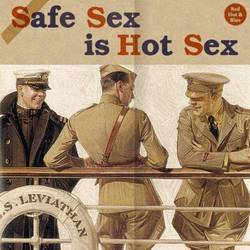
8. Easy to talk about who deserved better. Who deserved worse?
Possibly controversial - Alec. He doesn't seem to care about Sandy's feelings or respect him all that much, and strikes me as someone who likes being in a relationship so they've got company when they want it, but isn't all that interested in actually making a commitment himself.
9. You can break the fourth wall (at any point in the novel) and say a single sentence to our protagonist, Laurie Odell. What do you say?
I'd tell him not to dismiss Reg as abruptly as he does. That friendship could definitely have continued, because Reg clearly knew Laurie was queer and was determined to (albeit clumsily) make the point that he didn't view him differently because of it.
10. What's a question you have about TC? One you haven't found an answer for yet.
What was in Ralph's letter to Laurie, the one that was returned after Dunkirk?
I'm pretty sure everyone has already been tagged but if anyone hasn't, and wants to join in, then please do!
10 notes
·
View notes
Text
XO, Kitty and the start of the queer character evolution.
(Spoilers for XO Kitty Below!)
I’m always one for teen dramas. It’s a guilty pleasure that I take much delight in. Classic rom-coms like 10 Things I Hate About You and Clueless have always been my favourites. But to me, they always felt too straight. Too much heteronormative things and none of the queer rep I always wanted, even in more modern films and TV Shows in the genre.
To All the Boys I’ve Loved Before has always been one of my favourtie movies, so, when I found out about the spin off series XO, Kitty, I was ecstatic. Kitty had always been a character I resonated with and I loved all of Jenny Han’s other work.
Going into it, I expected the classic two boys fighting over one girl love triangle, a gay best friend and the girl best friend that I always seem to ship the main character with. I had predicted most of the story from the start. Until.
XO, Kitty is far from the ‘girl meets boy’ I was familiar with. It’s a queer love story and a coming out story and a self-discovery story. Definitely not the black and white romance i thought it would follow.
We have Q, the GBF, who is far from the feminine male sterotype you see in teen TV. He doesn’t give Kitty fashion advice and makeovers (which isn’t a bad thing btw), but a jock, the atheltic scholarship kid, who sure, does know a good dress when he sees one, but takes on a character that’s still such a worthy queer person without having to fall into the feminine sterotype.
Then we have Yuri, the Korean ‘it’ girl, also the girl best friend. She’s not the bimbo pick me girl you think she might me. She’s complex and interesting and she’s gay. Her storyline is something you don’t see often, and they really delve into the struggles of what it’s like being queer in a place and family where you’re not allowed to. Her journey is beautiful and powerful and reflects the coming out struggle in such an honest way, without making her story as a queer person just about coming out. She says the line ‘I have to live a fake life just so you’ll keep loving me’, when coming out to her mum and that encompassed so much of my current queer experience, especially as a person of colour. I think that it was for me, a sort of ‘Hey! we’re in the same boat’ thing and really made me feel so much more seen. She’s a well developed queer character that isn’t reduced to a ‘placed there just for representation’ character.
And we have Kitty herself. The main character. I honestly did not expect Netflix and the producers to go in this direction, but Kitty is queer. At first, I didn’t know if they were just sorta doing it for the sake of it. It didn’t feel like a deliberate decision. Maybe more of a thought that crosses her mind during the show. But Kitty has a crush on Yuri, and the way they address it is so different. They don’t exactly show that coming out to yourself thought process (which I kind of wish they did), rather, Kitty likes Yuri and she just accepts that, which I think is cool. I like now we don’t always need this big revelation moments (although, they’re still cool), but I think it shows the progression of how we treat queer characters as not spectacles for the audience, but just, people. Kitty’s crush on Yuri also felt very resemblant to my own crush on my friend which was probably why I related to her so much but just in general, it felt so natural to just have a queer main character in a non-queer focused show. Like, this wasn’t Hearstopper. No one expected it to be, yet, here we are, and I’m so happy about that.
This evolution into organically created queer characters is something we defnintely need more of and I’m so glad that Netflix is taking the step to do so. ALTHOUGH I REALLY HOPE THIS IS NOT BECAUSE THEY’RE TRYING TO GET REDEMPTION FOR CANCELLING ALL THE OTHER SAPPHIC SHOWS.
I also feel like though, that Jenny Han is just like a great person because whenever it’s her books being adapted, there’s always this like ‘organic queerness’. Like, in The Summer I Turned Pretty, there’s this guy Jeremiah, who in her book is presented as this straight guy, but in the show he just like kisses some guy and it was a dileberate from of causal representation (if that’s even a thing). Like kissing that guy didn’t add to the plot, but it wasn’t queerbaiting either because (well for me personally) I felt like the directors were like ‘This is Jeremiah. He’s queer, and he’s a main love interest’ and being queer didn’t like shatter the earth around him, it was just a part of him, as it is for all queer people.
But XO, Kitty itself aside from Kitty and Yuri is so good (maybe because I’m a sucker for these things), but everything about it just makes me squeal. I feel like teen TV is taking a turn in terms of creating realistic characters. And while we still have a long way to go (GENDER DIVERSE AND CULTURALLY DIVERSE PEOPLE!!!! CMON NETFLIX), XO, Kitty feels like a really big win for queer (and especially QPOC) people.
#xo kitty#kitty song covey#queer#lgbtq#representation#@netflix#watch xo kitty#its so good#im obsessed#rant
68 notes
·
View notes